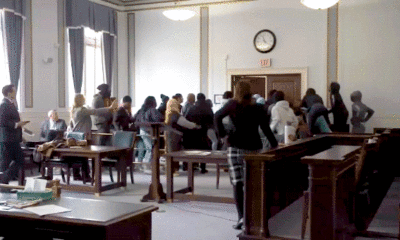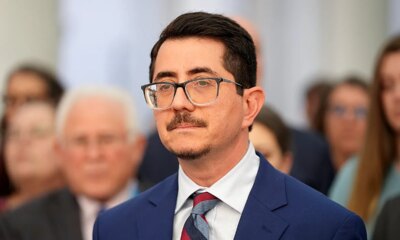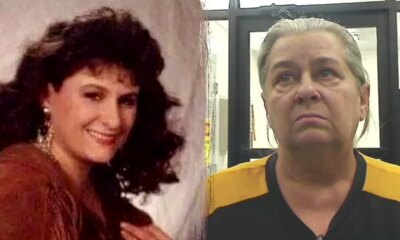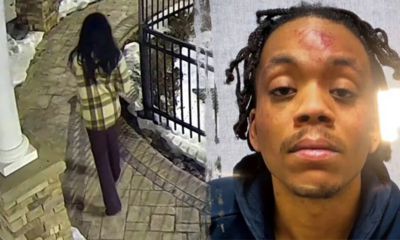South-Carolina
Robert Towne, Oscar-winning writer of 'Chinatown,' dies at 89

NEW YORK — Robert Towne, the Oscar-winning screenplay writer of Shampoo, The Last Detail and other films, whose script for Chinatown became a model of the art form and helped define the jaded allure of his native Los Angeles, has died. He was 89.
Towne died Monday surrounded by family at his home in Los Angeles, said publicist Carri McClure. She declined to comment on any cause of death.
In an industry which gave birth to rueful jokes about the writer’s status, Towne for a time held prestige comparable to the actors and directors he worked with. Through his friendships with two of the biggest stars of the 1960s and ’70s, Warren Beatty and Jack Nicholson, he wrote or co-wrote some of the signature films of an era when artists held an unusual level of creative control.
The rare “auteur” among screen writers, Towne managed to bring a highly personal and influential vision of Los Angeles onto the screen.
“It’s a city that’s so illusory,” Towne told The Associated Press in a 2006 interview. “It’s the westernmost west of America. It’s a sort of place of last resort. It’s a place where, in a word, people go to make their dreams come true. And they’re forever disappointed.”
Recognizable around Hollywood for his high forehead and full beard, Towne won an Academy Award for Chinatown and was nominated three other times, for The Last Detail, Shampoo and Greystoke. In 1997, he received a lifetime achievement award from the Writers Guild of America.
“His life, like the characters he created, was incisive, iconoclastic and entirely (original),” said Shampoo actor Lee Grant on X.
Towne’s success came after a long stretch of working in television, including The Man from U.N.C.L.E and The Lloyd Bridges Show, and on low-budget movies for “B” producer Roger Corman. In a classic show business story, he owed his breakthrough in part to his psychiatrist, through whom he met Beatty, a fellow patient. As Beatty worked on Bonnie and Clyde, he brought in Towne for revisions of the Robert Benton-David Newman script and had him on the set while the movie was filmed in Texas.
Towne’s contributions were uncredited for Bonnie and Clyde, the landmark crime film released in 1967, and for years he was a favorite ghost writer. He helped out on The Godfather, The Parallax View and Heaven Can Wait among others, and referred to himself as a “relief pitcher who could come in for an inning, not pitch the whole game.”
But Towne was credited by name for Nicholson’s macho The Last Detail and Beatty’s sex comedy Shampoo and was immortalized by Chinatown, the 1974 thriller set during the Great Depression.
Chinatown was directed by Roman Polanski and starred Nicholson as J.J. “Jake” Gittes, a private detective asked to follow the husband of Evelyn Mulwray (played by Faye Dunaway). The husband is chief engineer of the Los Angeles Department of Water and Power and Gittes finds himself caught in a chaotic spiral of corruption and violence, embodied by Evelyn’s ruthless father, Noah Cross (John Huston).
Influenced by the fiction of Raymond Chandler, Towne resurrected the menace and mood of a classic Los Angeles film noir, but cast Gittes’ labyrinthine odyssey across a grander and more insidious portrait of Southern California. Clues accumulate into a timeless detective tale, and lead helplessly to tragedy, summed up by the one of the most repeated lines in movie history, words of grim fatalism a devastated Gittes receives from his partner Lawrence Walsh (Joe Mantell): “Forget it, Jake, it’s Chinatown.”
Towne’s script has been a staple of film writing classes ever since, although it also serves as a lesson in how movies often get made and in the risks of crediting any film to a single viewpoint. He would acknowledge working closely with Polanski as they revised and tightened the story and arguing fiercely with the director over the film’s despairing ending — an ending Polanski pushed for and Towne later agreed was the right choice. (No one has officially been credited for writing “Forget it, Jake, it’s Chinatown”).
But the concept began with Towne, who had turned down the chance to adapt The Great Gatsby for the screen so he could work on Chinatown, partly inspired by a book published in 1946, Carey McWilliams’ Southern California: An Island on the Land.
“In it was a chapter called ‘Water, water, water,’ which was a revelation to me. And I thought, ‘Why not do a picture about a crime that’s right out in front of everybody?,’ ” he told The Hollywood Reporter in 2009.
“Instead of a jewel-encrusted falcon, make it something as prevalent as water faucets, and make a conspiracy out of that. And after reading about what they were doing, dumping water and starving the farmers out of their land, I realized the visual and dramatic possibilities were enormous.”
The back story of Chinatown has itself become a kind of detective story, explored in producer Robert Evans’ memoir, The Kid Stays in the Picture; in Peter Biskind’s East Riders, Raging Bulls, a history of 1960s-1970s Hollywood, and in Sam Wasson’s The Big Goodbye, dedicated entirely to Chinatown. In The Big Goodbye, published in 2020, Wasson alleged that Towne was helped extensively by a ghost writer — former college roommate Edward Taylor. According to The Big Goodbye, for which Towne declined to be interviewed, Taylor did not ask for credit on the film because his “friendship with Robert” mattered more.
Wasson also wrote that the movie’s famous closing line originated with a vice cop who had told Towne that crimes in Chinatown were seldom prosecuted.
“Robert Towne once said that Chinatown is a state of mind,” Wasson wrote. “Not just a place on the map in Los Angeles, but a condition of total awareness almost indistinguishable from blindness. Dreaming you’re in paradise and waking up in the dark — that’s Chinatown. Thinking you’ve got it figured out and realizing you’re dead — that’s Chinatown.”
The studios assumed more power after the mid-1970s and Towne’s standing declined. His own efforts at directing, including Personal Best and Tequila Sunrise, had mixed results. The Two Jakes, the long-awaited sequel to Chinatown, was a commercial and critical disappointment when released in 1990 and led to a temporary estrangement between Towne and Nicholson.
Towne’s greatest regret, he said in the 2006 AP interview, was how Greystoke turned out. Towne wrote the adaptation of Edgar Rice Burroughs’ novel Tarzan of the Apes and wanted to direct it. But production troubles on Personal Best bled into his hopes for Greystoke. Hugh Hudson, instead, directed the 1984 film. And while Greystoke received three Oscar nominations, including for Towne’s script, he was unhappy with the result. Towne took the name of his dog, P.H. Vazak, for his screenwriting credit, making Vazak an unlikely Oscar nominee.
Around the same time, he agreed to work on a movie far removed from the art-house aspirations of the ’70s, the Don Simpson-Jerry Bruckheimer production Days of Thunder, starring Tom Cruise as a race car driver and Robert Duvall as his crew chief. The 1990 movie was famously over budget and mostly panned, although its admirers include Quentin Tarantino and countless racing fans. And Towne’s script popularized an expression used by Duvall after Cruise complains another car slammed him: “He didn’t slam into you, he didn’t bump you, he didn’t nudge you. He rubbed you.
“And rubbin,’ son, is racin.’”
Towne later worked with Cruise on The Firm and the first two Mission: Impossible movies. His most recent film was Ask the Dust, a Los Angeles story he wrote and directed that came out in 2006. Towne was married twice, the second time to Luisa Gaule, and had two children. His brother, Roger Towne, also wrote screenplays, his credits including The Natural.
Towne was born Robert Bertram Schwartz in Los Angeles and moved to San Pedro after his father’s business, a dress shop, closed down because of the Great Depression. (His father changed the family name to Towne). He had always loved to write and was inspired to work in movies by the proximity of the Warner Bros. Theater and from reading the critic James Agee. For a time, Towne worked on a tuna boat and would speak often of its impact.
“I’ve identified fishing with writing in my mind to the extent that each script is like a trip that you’re taking — and you are fishing,” he told the Writers Guild Association in 2013. “Sometimes they both involve an act of faith. … Sometimes it’s sheer faith alone that sustains you, because you think, ‘God damn it, nothing — not a bite today. Nothing is happening.’ ”
Copyright 2024 NPR

South-Carolina
How to watch Tennessee Volunteers: Live stream info, TV channel, game time | March 3

The college basketball slate on Tuesday will include Mike Sharavjamts and the South Carolina Gamecocks (12-17, 3-13 SEC) hosting Nate Ament and the No. 25 Tennessee Volunteers (20-9, 10-6 SEC) at Colonial Life Arena, with the matchup tipping at 6 p.m. ET.
See more details below, including how to watch this game on SEC Network.
Here’s everything you need to prepare for Tuesday’s college hoops action.
South Carolina vs. Tennessee: How to watch on TV or live stream
- Game day: Tuesday, March 3, 2026
- Game time: 6 p.m. ET
- Location: Columbia, South Carolina
- Arena: Colonial Life Arena
- TV Channel: SEC Network
- Live stream: Fubo – Watch NOW (Regional restrictions may apply)
Check out: USA TODAY Sports Coaches Poll
Watch college basketball on Fubo!
Tennessee vs. South Carolina stats and trends
- Tennessee is averaging 80.1 points per game (87th-ranked in college basketball) this year, while ceding 69.2 points per contest (62nd-ranked).
- The Volunteers are dominating when it comes to rebounding, as they rank third-best in college basketball in boards (40.1 per game) and second-best in boards allowed (25.8 per contest).
- Tennessee ranks 32nd in the country with 17.0 assists per game.
- The Volunteers are committing 11.6 turnovers per game (240th-ranked in college basketball). They are forcing 10.6 turnovers per contest (231st-ranked).
- Tennessee is making 6.8 threes per game (279th-ranked in college basketball). It has a 34.3% shooting percentage (167th-ranked) from three-point land.
- With 7.9 threes conceded per game, the Volunteers rank 196th in the country. They are giving up a 30.5% shooting percentage from three-point land, which ranks 29th in college basketball.
- Tennessee is attempting 41.3 two-pointers per game this year, which account for 67.7% of the shots it has taken (and 76.2% of the team’s baskets). Meanwhile, it is attempting 19.7 three-pointers per contest, which are 32.3% of its shots (and 23.8% of the team’s buckets).
Tennessee vs. South Carolina Odds and Spread
- Spread Favorite: Volunteers (-8.5)
- Moneyline: Tennessee (-437), South Carolina (+328)
- Total: 143.5 points
NCAA Basketball odds courtesy of BetMGM Sportsbook. Odds updated Tuesday at 1:12 a.m. ET. For a full list of sports betting odds, access USA TODAY Sports Betting Scores Odds Hub.
Watch college basketball on Fubo!
Follow the latest college sports coverage at College Sports Wire.
South-Carolina
Bombing of Iran could mean South Carolinians paying more for gas
Visuals of strike on Iran released
The United States released images it said showed US warships and planes launching strikes against Iran.
An escalating conflict involving U.S. and Israeli strikes on Iran in March 2026 has initiated a sharp rise in global energy prices.
Analysts predict a significant uptick in U.S. gasoline prices, including in South Carolina, which often has some of the lowest gas prices in the country.
As of March 2026, AAA reports the national average for regular gasoline is $2.997 per gallon.
Based on projections released earlier this year in the Short-Term Energy Outlook, 2026 was initially forecast to have lower gas prices than 2025. With an expected 6% decrease, translating into approximately a 20-cent-per-gallon drop.
However, due to the conflict, these projections are now uncertain, and prices may not follow the anticipated trend.
“The national average price of gasoline has climbed for a fourth straight week, driven primarily by seasonal tightening and broader market dynamics,” said Patrick De Haan, head of petroleum analysis at GasBuddy.
In the week ahead, De Han stated, gasoline prices are likely to face heightened upward pressure as seasonal trends continue and markets navigate this evolving geopolitical landscape, with the national average poised to reach the $3-per-gallon mark for the first time this year.
“Looking ahead, markets will now begin reacting to this weekend’s U.S.-Iran attacks, which have elevated geopolitical risk premiums even in the absence of immediate supply disruption,” said De Haan. “Oil prices have firmed as traders assess the potential for further escalation, and while fundamentals such as inventories and refinery activity remain important anchors, the risk of broader instability, particularly involving key transit routes, has injected fresh uncertainty into energy markets.”
Here’s what South Carolinians need to know.
How much is gas in South Carolina?
South Carolina’s average gasoline price remains significantly lower than the national average.
In South Carolina, the average price for regular gasoline currently stands at $2.666 per gallon, according to AAA. Mid-grade gasoline is priced at $3.099, premium gasoline is $3.494, and diesel is priced at $3.505.
Gas price hikes anticipated as bombing continue in Iran
South Carolina drivers should consider filling up their gas tanks soon to avoid potential price spikes.
Analysts expect crude oil, which ended trading on Friday, Feb. 27, at about $67 a barrel, to open this week at $90 or higher as traders process the news that Iranian forces have restricted traffic through the crucial Strait of Hormuz.
Why are gas prices rising?
Iran is a major oil producer, and the ongoing conflict has disrupted the flow of oil and gas through the Strait of Hormuz, where 20% of the world’s oil passes, according to reports from USA TODAY.
Iran’s Revolutionary Guard has warned vessels to avoid the area, and major shipping companies like Maersk have suspended all crossings. Saudi Arabia, Iraq and the United Arab Emirates send most of their oil exports through there.
This disruption has and could continue to reduce supply, driving prices up as demand remains steady.
“Too many global economies depend on that corridor to remain blocked,” De Haan said. “Markets price high transaction costs and additional uncertainty, he says, but he is not expecting full closure.”
If access through the strait is limited for an extended period, prices could rise “materially above $100/barrel,” said analysts at TD Securities in a March 1 note.
On the other hand, if access through the strait is guaranteed and hostilities cease, the added costs to account for the extra risk could evaporate in a matter of weeks, the TD team wrote.
“If it becomes clear this week that the tensions with Iran are short-lived, then oil prices will come back to the 60s,” said Rob Thummel, portfolio manager at $9 billion investment manager Tortoise Capital, in emailed remarks to USA TODAY.
Has South Carolina hit highest record average gas prices?
Despite the current spike in gas prices due to the conflict, South Carolina has not yet surpassed its highest recorded average prices, according to AAA.
The record for regular unleaded gasoline in the state was $4.609 per gallon on June 12, 2022.
Diesel hit a peak of $5.638 per gallon on June 10, 2022.
March gas price outlook: What drivers need to know about gas prices
As reported by USA TODAY on Feb. 28, the national average for U.S. gas prices is likely to push above $3 a gallon on March 2 for the first time this year.
Over the next couple of weeks, prices will likely hit at least $3.10 to $3.15 a gallon.
There’s also a normal seasonal increase in gas prices around this time of year, driven by seasonal pipeline maintenance, the transition to more expensive summer-blend fuel, and an increase in driving, according to GasBuddy analysis.
Rob Thummel, portfolio manager at $9 billion investment manager Tortoise Capital, expects gas prices to rise in roughly the same rate as oil prices over the coming weeks.
If crude jumps 10%, gas prices will as well, said Thummel.
Upstate SC Gas landscape
According to GasBuddy, in Greenville, Spartanburg, and Anderson, gas prices have shown similar trends to the national average, with drivers experiencing gradual increases at the pump.
Upstate South Carolina stations are adjusting prices in response to crude oil fluctuations and seasonal factors. Here’s the latest prices as of Mondy, March 2 at noon:
Greenville gas prices
- Stop-A-Minit: 1091 S Piedmont Hwy., recently reported $2.47
- Power Trac: 470 Bessie Road, recently reported $2.47
- BP: 1631 White Horse Road, recently reported $2.49
- Payal Express Mart: 1800 Easley Bridge Road, recently reported $2.49
Spartanburg gas prices
- QuikTrip: 21 Fairview Church Road, recently reported $2.26
- Walmart Neighborhood Market: 201 Cedar Springs Road, recently reported $2.27
- Costco Wholesale: 211 W Blackstock Road, recently reported $2.31
- Sam’s Club, 200 Peachwood Center Drive, recently reported $2.31
Anderson gas prices
- Spinix: 3221 S Murray Ave., recently reported $2.31.
- Raceway: 4606 Clemson Blvd., recently reported $2.34.
- BP: 501 E Greenville St., recently reported $2.39.
- Sam’s Club: 3812 Liberty Hwy., recently reported $2.44
Travis Jacque Rose is the trending news reporter for the Greenville News, part of the USA TODAY Network. Reach him at trose@gannett.com
South-Carolina
Rev. Jesse Jackson returns home to South Carolina to lie in state
COLUMBIA, S.C. (AP) — After a long career of fighting for civil rights, the Rev. Jesse Jackson Sr. is visiting his home for one last time to lie in state at the South Carolina capitol on Monday.
The final full honors from the state where he was born is a far cry from his childhood in segregated Greenville, where in 1960 he couldn’t go inside the local library’s much better funded whites-only branch to check out a book he needed.
Jackson led seven Black high school students into that segregated branch, where they sat down and read books and magazines until they were arrested. The branches closed, then quietly reopened for all.
With that action, Jackson launched his career — and crusade — fighting for equality for all. He would catch the attention of the Rev. Martin Luther King Jr. and join the voting rights march King led from Selma to Montgomery, Alabama.
Jackson died Feb. 17 at age 84 after battling a rare neurological disorder that affected his mobility and ability to speak in his later years.
The South Carolina services are part of two weeks of events. It began with Jackson’s body lying in repose and the public invited last week to his Rainbow PUSH Coalition’s Chicago headquarters.
After South Carolina, Jackson will be returned to Chicago for a large celebration of life gathering at a megachurch and the final homegoing services at the headquarters of Rainbow PUSH. Plans for a service in Washington, D.C., to honor him have been postponed until a later date.
Nationally, Jackson advocated for the poor and underrepresented for voting rights, job opportunities, education and health care. He scored diplomatic victories with world leaders.
Trough his Rainbow PUSH Coalition, he channeled cries for Black pride and self-determination into corporate boardrooms, pressuring executives to make America a more open and equitable society. He stepped forward as the Civil Rights Movement’s torchbearer after King’s assassination, and would run for the Democratic presidential nomination in 1984 and 1988.
Jackson continued to be active in his home state, pushing in 2003 for Greenville County to honor King by matching the federal holiday in his honor and in 2015 by advocating for removing the Confederate flag from South Carolina Statehouse grounds after nine Black worshipers were killed in a racist shooting at a Charleston church.
Jackson is just the second Black man to lie in state at the South Carolina capitol. State Sen. Clementa Pinckney was honored in 2015 after he was shot and killed in the Charleston church shooting.
___
Associated Press writer Sophia Tareen in Chicago contributed to this report.
-

 World5 days ago
World5 days agoExclusive: DeepSeek withholds latest AI model from US chipmakers including Nvidia, sources say
-

 Massachusetts6 days ago
Massachusetts6 days agoMother and daughter injured in Taunton house explosion
-

 Denver, CO6 days ago
Denver, CO6 days ago10 acres charred, 5 injured in Thornton grass fire, evacuation orders lifted
-

 Louisiana1 week ago
Louisiana1 week agoWildfire near Gum Swamp Road in Livingston Parish now under control; more than 200 acres burned
-

 Oregon4 days ago
Oregon4 days ago2026 OSAA Oregon Wrestling State Championship Results And Brackets – FloWrestling
-

 Technology1 week ago
Technology1 week agoArturia’s FX Collection 6 adds two new effects and a $99 intro version
-

 News1 week ago
News1 week agoVideo: How Lunar New Year Traditions Take Root Across America
-

 Florida2 days ago
Florida2 days agoFlorida man rescued after being stuck in shoulder-deep mud for days


















